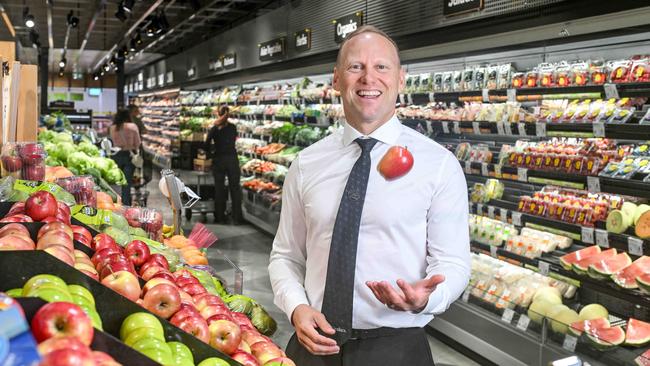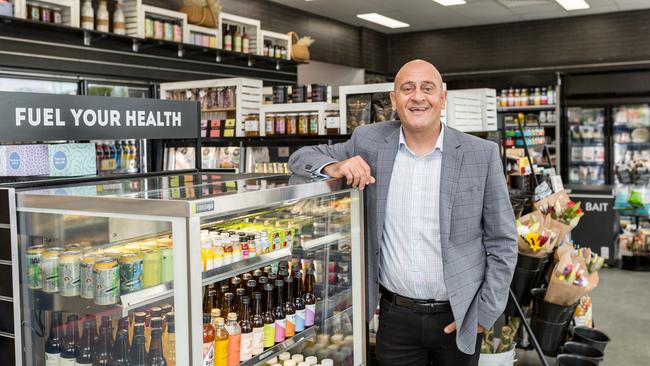Convenience stores and Drakes Supermarkets back Liberals plan to break up big retailers
Convenience store and independent grocery operators say the Coalition’s plans to break up supermarket giants who abuse their market power is a key to ending bully boy tactics.

Convenience store and independent grocery operators say the Coalition’s divestiture proposal for supermarket giants is a must, with measures needed to prevent major players from using market power to hurt competition.
Opposition Leader Peter Dutton on Tuesday sought to open a new front in the cost-of-living debate and take the fight to Labor and big business by proposing new divestiture power for major supermarket and hardware players with more than $5bn in turnover a year.
The policy is meant to serve as a deterrent against anti-competitive behaviour and is designed to target Aldi, Coles, Metcash and Woolworths.
Australian Association of Convenience Stores chief executive Theo Foukkare said while there was competition in the supermarket space, measures were needed to better serve both customers and smaller players.
“While there is competition in Australia in the supermarket space, it is still way too heavily concentrated in two main players, and that’s not just the supermarket space, but also in the liquor space and the hardware space,” he said. “As a strong advocate for small business, small and medium businesses, of which a lot of our retail members are, I think anything that can be done to bring any organisation that is abusing their market power to be fairer, both for consumers as well as for small business is a good, strong signal moving forward.”
Retailers exceeding the $5bn turnover threshold would also face infringement notices of up to $2m for contraventions of the food and grocery code under the plan from Mr Dutton. The maximum penalty of $10m for more harmful breaches – as recommended by Craig Emerson in his supermarket review – is endorsed under the Coalition plan.
John-Paul Drake, director of Drakes Supermarkets which operates more than 60 grocery stores in South Australia and Queensland, said measures to open up competition was good and added that good businesses had nothing to fear.

“I welcome any measure put in place that allows more scrutiny into the way the duopoly operates. Ultimately, as a business if you’re not doing anything wrong or acting unethically, then you have nothing to worry about with this proposal,” he said. “But if you’re doing things like land banking with no intent to build a store, or paying over the odds in rent to muscle out smaller players, I think someone does need to stand up to the market bullies and say enough is enough.”
Woolworths and Coles have been accused in recent months of using market power to scoop up land, properties and shopping centres, in a practice known as “land banking”, to shut out competition and gain a stranglehold on a neighbourhood.
Metcash told a senate inquiry in April that it had been forced to purchase a Brighton property in Adelaide to stop Coles buying it and possibly throwing out the IGA.
Mr Foukkare said there also continued to be examples of Coles and Woolworths expanding their Business to Business supply chain, which affects some of its distribution members.
“Effectively, they’re using their retail stores around the country to, let’s call it sub-wholesale to other parts or other retail channels, which we don’t support,” he said. “The fact that a supermarket can sell a product at retail for cheaper than what some of our retail members can buy at wholesale is wild.”
Metcash Food chief executive Grant Ramage told the inquiry in April it was unclear whether divestiture powers would add to the choice for shoppers, questioning who would buy supermarkets in the event Woolworths and Coles were forced to offload them.
“We are concerned that divestiture of powers would not necessarily add to the choice for shoppers, and ultimately I think it’s the choice for shoppers that drives competition and is a restraint on pricing,” he said.
“I wouldn’t expect that the businesses that we work with and represent would be happy to pick up the supermarkets that Coles and Woolworths didn’t want. It would depend on the nature of the sites. It would very much be on a case-by case basis.”
Critics of the plan include the Business Council of Australia and the Australian Retailers Association, who say it would set a dangerous precedent, while Dr Emerson said the measures would unlikely change market concentration if it was an Australian buyer and foreign buyers were unlikely to swoop in.





To join the conversation, please log in. Don't have an account? Register
Join the conversation, you are commenting as Logout